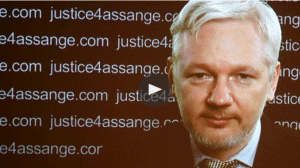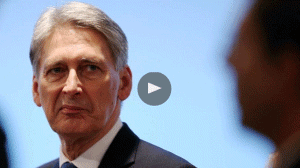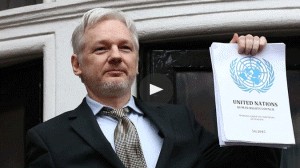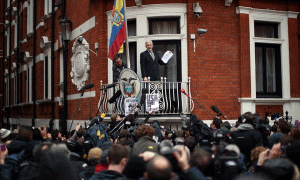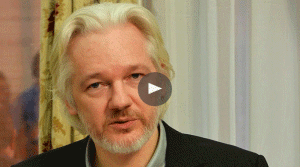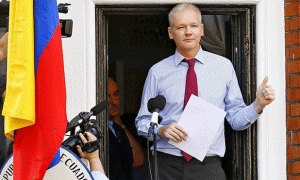by Esther Addley, Jessica Elgot and Owen Bowcott
5 February 2016
NOTICE: THIS WORK MAY BE PROTECTED BY COPYRIGHT
YOU ARE REQUIRED TO READ THE COPYRIGHT NOTICE AT THIS LINK BEFORE YOU READ THE FOLLOWING WORK, THAT IS AVAILABLE SOLELY FOR PRIVATE STUDY, SCHOLARSHIP OR RESEARCH PURSUANT TO 17 U.S.C. SECTION 107 AND 108. IN THE EVENT THAT THE LIBRARY DETERMINES THAT UNLAWFUL COPYING OF THIS WORK HAS OCCURRED, THE LIBRARY HAS THE RIGHT TO BLOCK THE I.P. ADDRESS AT WHICH THE UNLAWFUL COPYING APPEARED TO HAVE OCCURRED. THANK YOU FOR RESPECTING THE RIGHTS OF COPYRIGHT OWNERS.
Assange says Hammond’s dismissal of the UN’s finding as ridiculous is ‘beneath the stature that a foreign minister should express’
Julian Assange has accused Britain’s foreign secretary, Philip Hammond, of insulting the United Nations in his response to a panel finding that Assange’s circumstances amount to “arbitrary detention”.
Hammond called the panel’s finding “ridiculous” and said the WikiLeaks founder was a “fugitive from justice”. Assange, who fled to the Ecquadorian embassy in 2012 to avoid extradition to Sweden to face allegations of rape and sexual assault, said the remarks were “beneath the stature that a foreign minister should express in this situation”.
Assange said the panel’s finding was a “sweet” victory and added: “This is the end of the road for the legal arguments that have been put forward by Sweden and the UK.”
As anticipated, the finding by the Geneva-based UN panel criticised legal action against Assange by the UK and Sweden and blamed them for preventing him from leaving the Ecuadorian embassy in Knightsbridge.
Philip Hammond rejects ‘ridiculous’ UN decision on Julian Assange
The panel called on the Swedish and British authorities to end Assange’s “deprivation of liberty”, respect his physical integrity and freedom of movement and offer him compensation.
The report said: “The working group considered that Mr Assange has been subjected to different forms of deprivation of liberty: initial detention in Wandsworth prison, which was followed by house arrest and his confinement at the Ecuadorian embassy.
“Having concluded that there was a continuous deprivation of liberty, the working group also found that the detention was arbitrary because he was held in isolation during the first stage of detention and because of the lack of diligence by the Swedish prosecutor in its investigations, which resulted in the lengthy detention of Mr Assange.”
Appearing at a west London press conference by videolink from the Ecuadorian embassy, where he has remained since seeking asylum in 2012, Assange said that if Sweden and the UK continued to dispute the report, “the diplomatic effect is that it will become difficult for [the two countries] to be treated seriously as international players”.
He said they could become subject to penalties “up to and including sanctions”, though that would be a matter for the UN.
Later, Assange appeared on the balcony of the Ecuadorian embassy clutching a copy of the UN report. “How sweet it is. This is a victory that cannot be denied. It is a victory of historical importance for me, my family, my children and for the independence of the UN system.”
Assange declared he was “tough” enough to withstand longer confinement in the Ecuadorian embassy, but demanded the UK and Sweden heed the UN’s opinion that he is arbitrarily detained. Assange said his legal team would now examine if there were “criminal consequences” for the parties who he said continue to deny him his freedom, citing the UN Convention Against Torture.
At one point during his 12-minute appearance, as he was being heckled from the street, he said: “Can someone close that person up?”
Julian Assange speaks from the balcony of the Ecuador embassy in London
Baltasar Garzón, a Spanish judge who heads Assange’s international legal team, said the arrest warrant against his client was now “empty and void”. Garzón, who came to prominence in 1998 when he issued an arrest warrant for Chile’s former president Augusto Pinochet, said any continuation of Assange’s confinement “becomes a form of torture”.
Speaking at a joint press conference with his Iranian counterpart in London, Hammond forcefully rejected the findings of the UN panel. “This is frankly a ridiculous finding by the working group and we reject it.” He pointed out that the panel was made up of lay people, not lawyers.
The British government added in a statement: “This changes nothing. We completely reject any claim that Julian Assange is a victim of arbitrary detention. The UK has already made clear to the UN that we will formally contest the working group’s opinion.”
It said Assange was “voluntarily avoiding lawful arrest” by remaining in the Ecuadorian embassy.
The UN committee said one of its members, Leigh Toomey, had declined to take part in the inquiry because she, like Assange, is an Australian citizen. One of the other members, Vladimir Tochilovsky, a Ukrainian lawyer, had disagreed with the finding.
Only three of the five-member panel therefore supported the finding against the UK and Sweden.
Ken Macdonald QC, a former director of public prosecutions in the UK, condemned the UN panel report as misguided. He told the Guardian: “This report is beyond parody. Julian Assange is wanted in connection with a grave sexual offence in a country that has a fair trial justice system consistent with the highest international standards. Instead of cooperating with the Swedish authorities, as he should have done, Mr Assange has chosen to hole up in a foreign embassy, deliberately frustrating a serious criminal investigation.
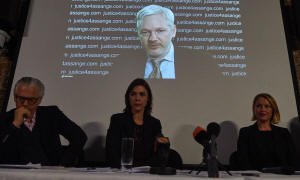
WikiLeaks founder Julian Assange is projected onto a screen behind Spanish jurist Baltasar Garzón and Australian lawyers Melinda Taylor and Jennifer Robinson. Photograph: Niklas Halle'N/AFP/Getty Images
“To describe his situation as ‘arbitrary detention’ is ludicrous. Rather than expecting Swedish prosecutors to visit him at his leisure in his hiding place, Mr Assange should recognise that he is not above the law, give himself up and answer the allegations he faces. The United Nations panel on arbitrary detention has embarrassed itself and all those concerned about real injustices in the world.”
The Swedish foreign ministry said: “The [Swedish] government does not agree with the assessment made by the majority of the working group. In light of the safeguards contained in the Swedish extradition and [European arrest warrant] procedures against any potential extradition in violation of international human rights agreements, the government reiterates its position that Mr Assange does not face a risk of refoulement [removal] contrary to international human rights obligations to the United States from Sweden.
“In any case, no request for extradition regarding Mr Assange has been directed to Sweden. Moreover, Mr Assange has chosen, voluntarily, to stay at the Ecuadorian embassy and Swedish authorities have no control over his decision to stay there. Mr Assange is free to leave the embassy at any point. Thus, he is not being deprived of his liberty there due to any decision or action taken by the Swedish authorities.”
Anthony Romero, executive director of the American Civil Liberties Union, said the UN panel’s findings should force the US government to end its investigations into Assange over the Wikileaks disclosures: “In light of this decision, it’s clear that any criminal charges against Mr Assange in connection with WikiLeaks’ publishing operations would be unprecedented and unconstitutional.
“Indeed, even the prolonged criminal investigation of WikiLeaks itself has had a profound chilling effect. The justice department should end that investigation and make clear that no publisher will ever be prosecuted for the act of journalism.”

